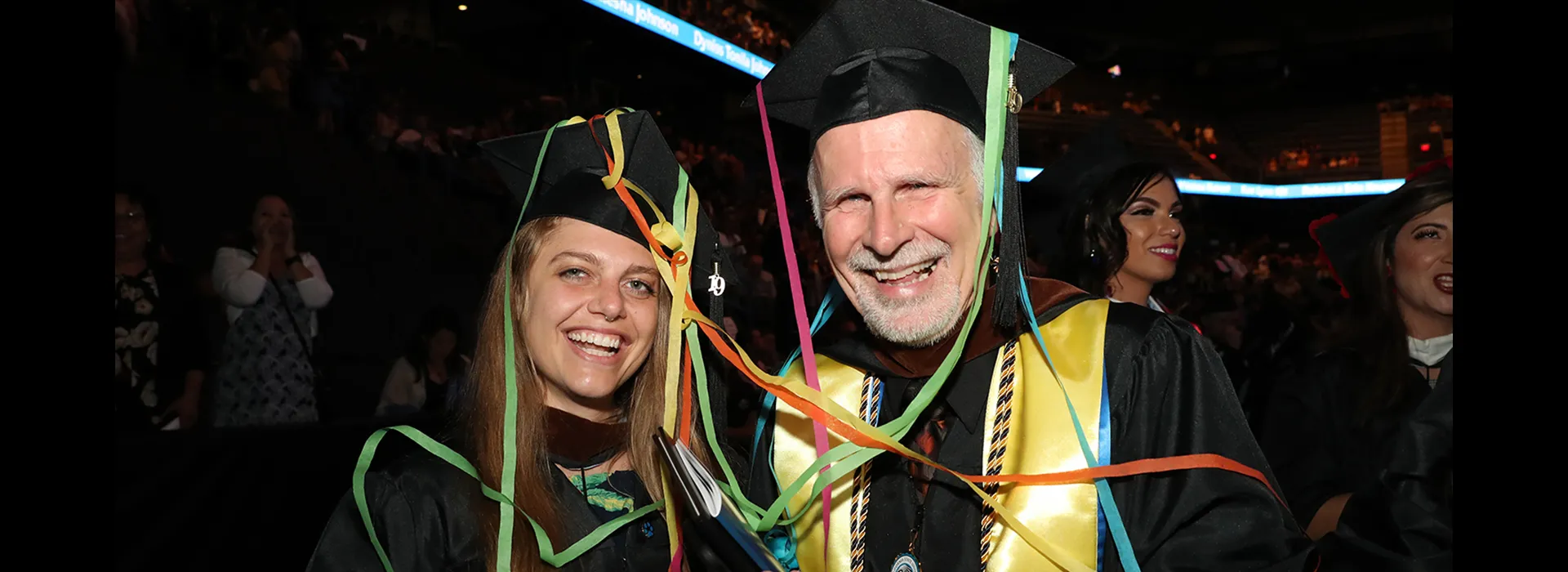Joe Gutierrez Office of Strategic Communication (909) 537-5007 joeg@csusb.edu

Cal State San Bernardino, recognized for its activities and diversity, has been named a member of the Age-Friendly University Global Network, a group of colleges and universities around the world committed to meeting and serving the needs of older adults.
“CSUSB’s commitment to ageing, as reflected in the breadth of its activities and diversity, brings an added richness to the Age-Friendly University (AFU) Global Network. This is a rapidly growing network (50 members currently) with a shared challenge to promote an inclusive approach to healthy and active ageing through research, enhanced learning opportunities for people across generations, and through innovations that address specific issues affecting older adults,” wrote AFU President Brian MacCraith in a letter to CSUSB President Tomás D. Morales.
CSUSB becomes the second California State University campus to join the network. Cal State Long Beach joined the AFU in January.
According to the AFU website, the network consists of institutions of higher education around the globe who have endorsed the 10 AFU principles (listed below) and committed themselves to becoming more age-friendly in their programs and policies. Joining the AFU AGHE network of global partners offers institutions the opportunity to learn about emerging age-friendly efforts and to contribute to an educational movement of social, personal, and economic benefit to students of all ages and institutions of higher education alike.
Eric Vogelsang, a CSUSB assistant professor of sociology who also serves as the director of the university’s Center on Aging, is the university’s initiative’s main point person.
“Universities have a responsibility to commit to and act upon these principles,” said Vogelsang. “Meeting the needs of our aging populace is a form of social justice that we do not hear enough about. As is evident by Forbes’ recent article on Age-Friendly Universities, this is a growing movement and I am very happy that CSUSB has been recognized as a worldwide leader in this movement.”
Vogelsang illustrated how CSUSB has already implemented a number of programs and initiatives that demonstrate its commitment to AFU principles.
The university’s Open University Program allows older students to explore academic interests, update or expand professional skills, and explore personal interests. Students may take regular degree credit courses on a “space available” basis, without formal admission to the university.
Another program, one of CSUSB’s most popular, is the Osher Lifelong Learning Institute at its Palm Desert Campus. The institute provides intellectually stimulating programming for the large and growing population of people 50 years and older in the Coachella Valley. Membership in the Osher program has more than doubled in just 3 years; from 400 in 2015 to 825 in 2018.
CSUSB also offers a Certificate Program in Gerontology to currently-enrolled undergraduate and graduate students; providing valuable multi-disciplinary training (incorporating sociology, psychology, health science, and kinesiology) to those interested in pursuing a career serving older adults, or for those simply wanting to learn more about our aging world.
During 2017-18, CSUSB awarded degrees to more than 300 students age 40 or older; in 2018-19 there were almost 800 undergraduate and graduate students age 40 and older. Of those, approximately 70 students were enrolled in CSUSB' s “Over 60 Program,” which waives student services fees. The university also offers a number of resources for middle-aged and older students, including the Career Center, Services for Students with Disabilities and the Osher Adult Re-Entry Student Success Center. In addition to traditional classrooms, mature students often enroll in one of CSUSB’s “100 percent online” or “blended online” programs.
CSUSB — as part of its Center on Aging — continues to conduct world-class gerontology research, led by professors from sociology, psychology, kinesiology, health science, nursing, and social work. The Center on Aging is also a part of numerous initiatives and collaborations with city and county agencies.
“The Inland Empire is going to be facing numerous challenges with respect to population aging, and CSUSB is uniquely qualified to help address, study, and meet these challenges,” said Vogelsang.
The Age-Friendly University Global Network principles are:
- To encourage the participation of older adults in all the core activities of the university, including educational and research programs.
- To promote personal and career development in the second half of life and to support those who wish to pursue second careers.
- To recognize the range of educational needs of older adults (from those who were early school-leavers through to those who wish to pursue Master's or Ph.D. qualifications).
- To promote intergenerational learning to facilitate the reciprocal sharing of expertise between learners of all ages.
- To widen access to online educational opportunities for older adults to ensure a diversity of routes to participation.
- To ensure that the university's research agenda is informed by the needs of an aging society and to promote public discourse on how higher education can better respond to the varied interests and needs of older adults.
- To increase the understanding of students of the longevity dividend and the increasing complexity and richness that aging brings to our society.
- To enhance access for older adults to the university's range of health and wellness programs and its arts and cultural activities.
- To engage actively with the university's own retired community.
- To ensure regular dialogue with organizations representing the interests of the aging population.
For more information, visit the Age-Friendly University Global Network.
For more information on the CSUSB Center on Aging, visit its website.